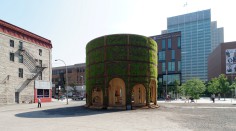Chris Salter
Horologion – Fountain House

source: chrissalter
The marble clocktower or horologion, the tower of the winds in the Roman Agora in Athens had multiple purposes in the ancient world: sundial, water clock, broadcaster and monitor of the winds. Horologion rethinks this architectural structure in terms of atmosphere and ambience. On each hour on the hour from October 2-26, 2014, an urban wind composed of city sound, light, mist and clouds will rush in, through and out of Raumlabor’s temporary architectural structure. Throwing open the window to the world. Water as timekeeper. Sound to light to vapour to wind – all in real time.
.
.
.
.
.
.
.
source: raumlabornet
Reexamining the fountain: In contemporary urban as well as cultural discussions we see a renaissance of the idea of common space, in german either translated as „Allmende“ or „Gemeinschaft“ depending on a relationship towards (city) space or social structures.
This is related to the dipole of the private vs. the public as the two dominant categories of the 20th century. Now in the 21st century we find many ways of being together as part of daily life, be it through social media or through community gardens or similar locally rooted projects.
On the other hand we tend to take for granted many achievements inherited from previous generations’ common efforts, without giving them a second thought. One of these heritages are public infrastructures.
The excellent quality of water coming from the tap is one of these neglected public goods. While international companies secure access to water as part of their economic models, in western cities this good is mostly distributed freely. In Montreal, water is even delivered free to most residential users.
The project wishes to re-address the notion of the public good by celebrating free access to it. the fountain house is to be a place for this celebration to find a place and a shape. To give it a presence in public-shared city spaces.
The Fountain House, with it’s open ground plan, overlapping archways for entering and accessible rooftop offers a space for various kinds of public use. It creates a new centre of attraction, a place to be around, to be in, to discover. This node structures the space and still allows surrounding programmes.
In the core, falling through a hole in the roof, a thin water fall is offered to the public, to drink, to observe or hear, to play with. The water is collected in a small basin and redistributed to the air thanks to nozzles creating a thin refreshing cloud slowly moving in the space of the fountain house.
The fountain house is located at the corner of Sainte Catherine and Clark, in a really central area of Montreal. Built on an undefined space, an inner city waiting land, with an eclectic architectural surrounding, the fountain house enhances the potential of the space. Stairs allow the visitor to reach the roof of the structure and enjoy a 360° panorama of the surrounding environment.
Besides being a public place of interaction and interchange, the fountain house is a place to celebrate life. It lives with the water, the fundamental element of all. The skin of the building is more than just a shelter or an enclosure. It lives and changes.
Plants, funghi and small organisms create their own small biological habitat on the outside, as well as the inside of the fountain house.

